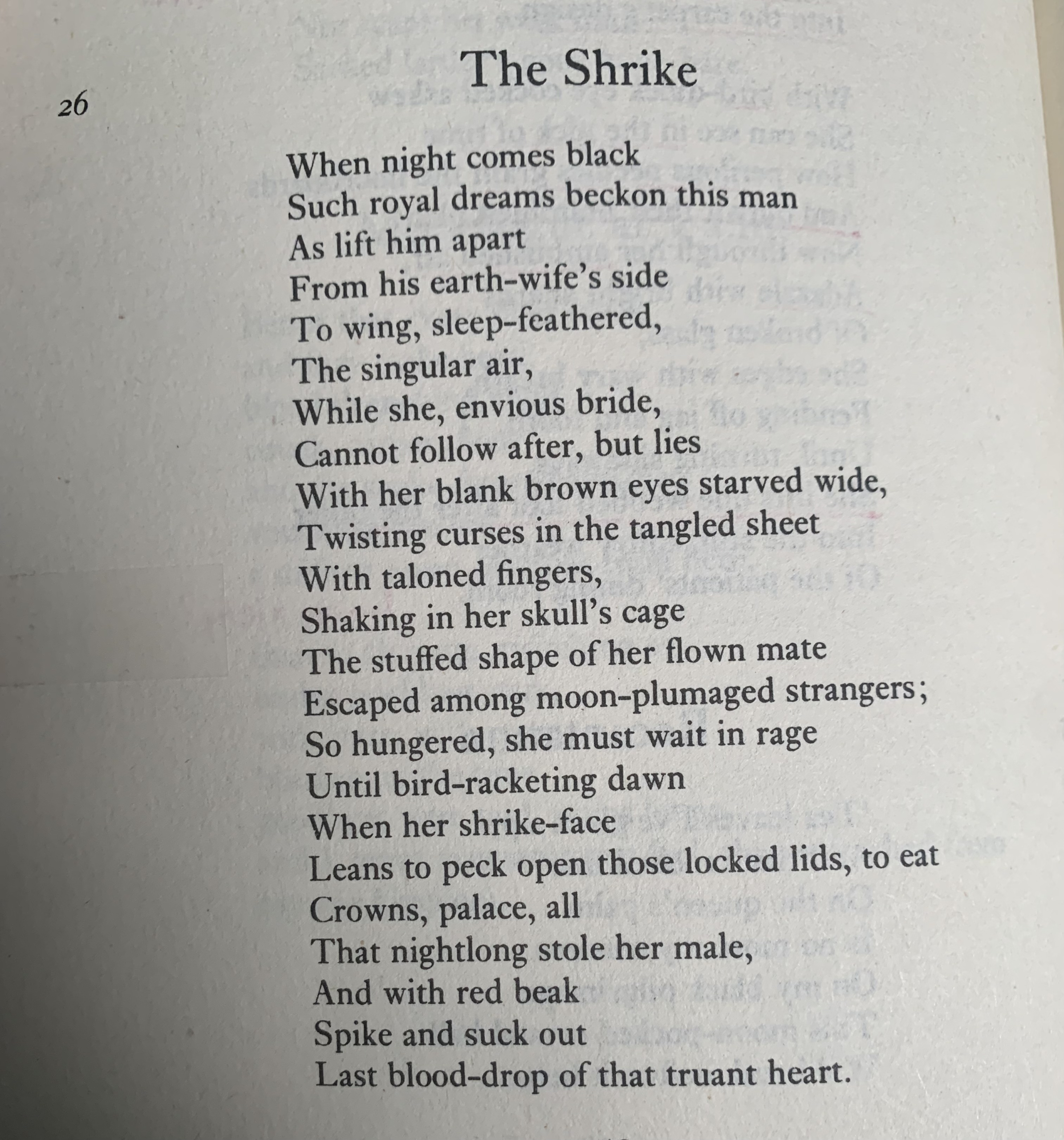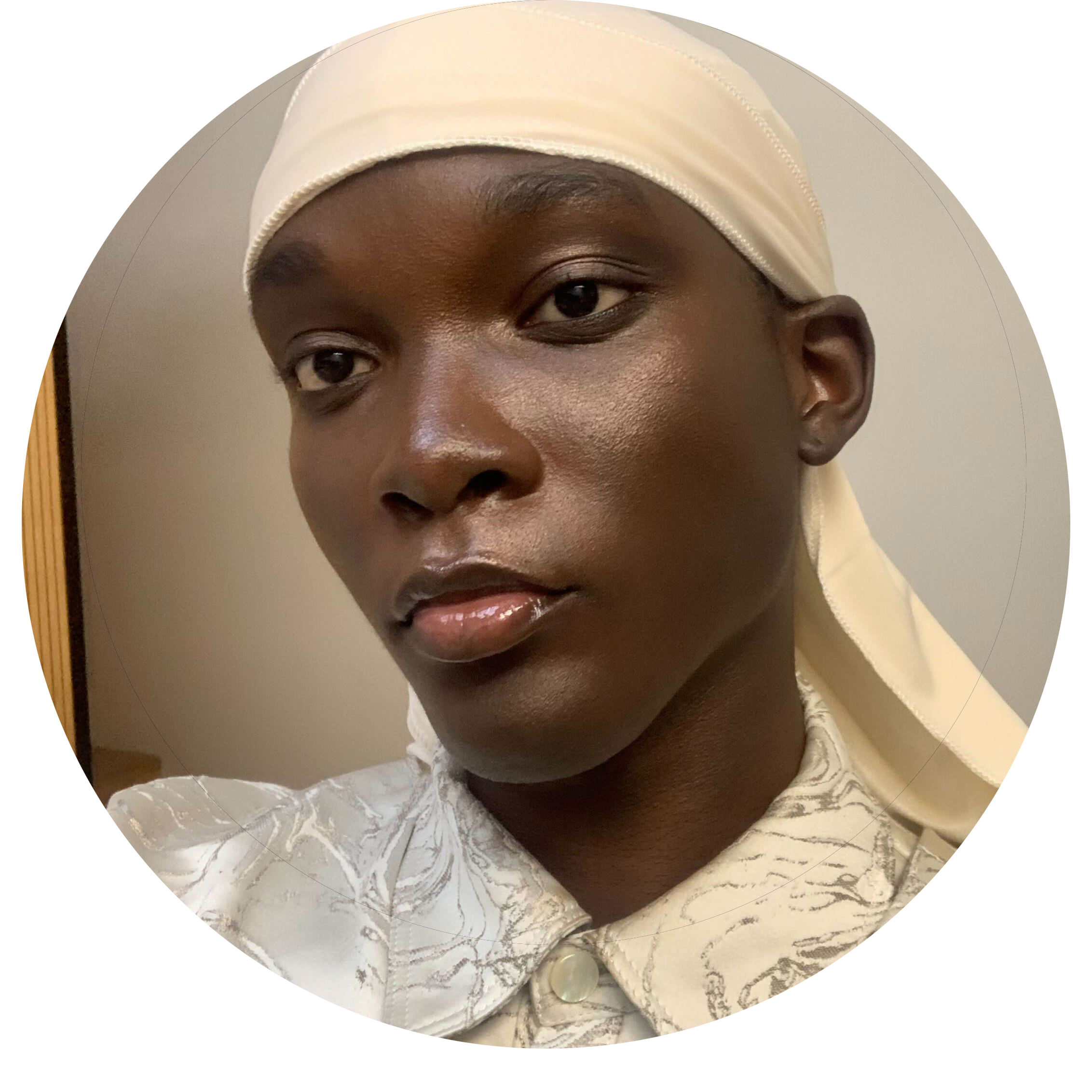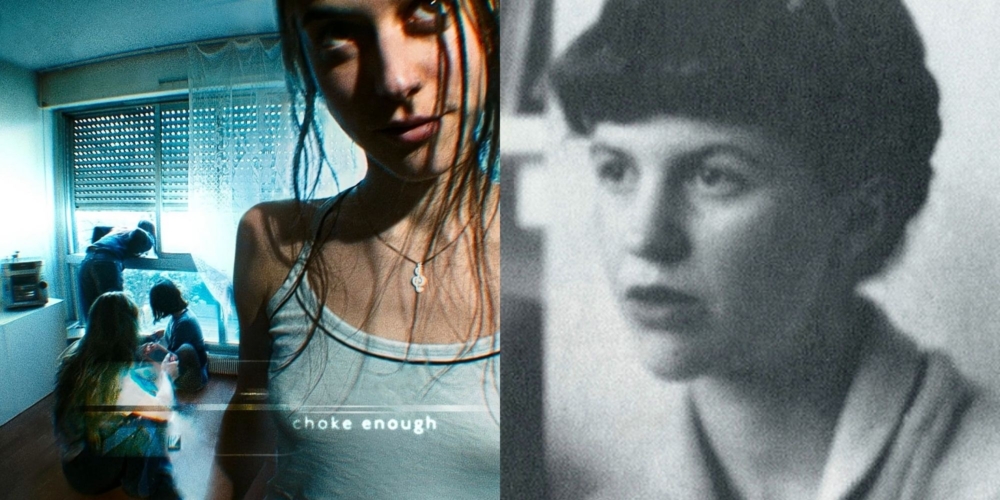Imagine the one whom we love consumed, savoured, and slowly eaten through the act of our love. After listening to French avant-pop darling Oklou’s recently released song, “blade bird,” this year’s Valentine’s Day found me reflecting on how romantic love so easily turns into cannibalism and possession. I wondered: If we imagine we were put on this earth to give love in order to receive it, what does it mean to love so intensely that it turns one into a tyrant?
Along this vein, the epilogue to Oklou’s third studio album, Choke Enough, led me back to my favourite poem about birds — ”The Shrike” by Sylvia Plath. Written in 1956, the same year 23-year-old Plath married 25-year-old poet, Ted Hughes, it remains one of my most beloved works from my favourite poet and the most interesting counterpart to Oklou’s “blade bird.” As I reread the poem, I thought about how, in trying to ground a partner and ‘hold them down,’ we may instead risk erotically crushing, performatively suffocating, and practically destroying the other under the weight of our desire, need, and expectation. Think of Lily-Rose Depp as Ellen and Bill Skarsgård as the titular vampire in Dave Eggers’ Nosferatu (2024) — that kind of vampiric seduction where consumption looks like passion, and pleasure takes on the rhythms of extraction, culminating in predator obliterating his prey in a moment of supposed mutual desire.
“blade bird” is delivered in all ethereal synths and steady percussion built around the wispy lilt of Oklou’s voice as a meekly distraught, blade-wielding lover. Oklou (pronounced OK, Lou) expresses a persona sensitive to the fundamental incompatibility between her and her lover in their nature. Their romantic passions, therefore, are incompatible too. “Knew it right away / You are what you are,” the song says. With this knowledge, the persona sings, fearful that not only her love, but her nature itself might be inhibiting her lover’s ability to be a free bird. The song goes:
I’ve come to terms
My baby is a bird
When you’re in the sky
I’m hoping you return…
You are what you are
and I feel like a cage
How can a cage and a bird be in love if it is not in the bird’s nature to be possessed? Her partner’s freedom, you see, is just as important to Oklou’s persona as the pleasure she derives from being with them. The tone struck me immediately—the maternal sorrow woven through “baby” and “bird,” which belies a dynamic of power that is ripe for abuse. The song captures the feeling of watching someone you love outgrow you—like Icarus outgrew Daedalus the moment he flew toward the sun—while you, grounded in your attempts to protect them from a terrible world, become the one holding them back from their destiny. It doesn’t matter that their destiny may plunge them into the Aegean Sea, where they will drown. What matters is that they have the freedom to take that risk. It was 20th-century confessional poetry reborn into pop futurism with the beauty and severity of Anne Sexton or Sylvia Plath, who I thought of immediately for “The Shrike.”
In “The Shrike,” Plath writes:
When night comes black
Such royal dreams beckon this man
As lift him apart
From his earth-wife’s side
To wing, sleep-feathered,
The singular air,
While she, envious bride,
Cannot follow after, but lies
With her blank brown eyes starved wide
In their art, nearly a century apart, Oklou and Plath meet in relationship with the paradoxical image and persona of the predatory songbird. Where the French singer embodies the songbird by vocalizing as the blade and cage, Plath performs through the shrike as a “starved,” lonely “earth-wife,” burdened to life on the ground, unable to follow her husband—a more powerful flier—who travels to the moon, chasing his “royal dreams” with other “moon-plumaged strangers.” With “The Shrike,” the power dynamic is reversed. The suffering is steeped in gender disparity. The wife, pressed further down by the conventions of womanhood, is too feeble to follow her husband into the sky; instead, it is his freedom that cages her in despair, leaving her with no choice but to entrap him.
Frustrated, Plath slants the poem’s rhyme, making rhythm from fragmentation and irregularity to create a woman so fundamentally unsettling in her earnest desire. Because she simply needs to be loved and never left alone, she entertains fantasies of killing her husband, becoming the very blade and cage that Oklou fears. It is almost comical. She would rather sleep with a dead man than sleep alone in her marriage bed.
Oklou refutes Plath’s dangerousness with compassion and self-awareness. In “blade bird,” the tension comes from a lover trying to see their needs met while understanding their partner’s right to freedom which may not align with said needs. Oklou’s persona understands the harm she poses to the bird as she rests her blade on them, burdening them with her disturbing, destructive nature and sharp, uncomfortable, existence. She understands that she could cut, and potentially destroy a beautiful living thing. And yet, in failing to draw their blood, it is she, “who ends up getting hurt:”
You’re so cute
My blade is on the bird
I’ll be the one
Who ends up getting hurt
Plath’s poem in contrast embodies a darker, more possessive side of desire. Where Oklou only implicitly confesses it, Plath’s persona wants to “peck open those locked eyelids” and eat her husband’s wounded flesh. Plath confesses to a love that transforms into a cannibalistic appetite—a need to anchor the other, striking him with her hooked beak, pinning him down in death. As a bird which cannot fly more than one hundred meters above ground, the shrike must bring her mate down to her level and keep him there. To feel emotionally secure and satisfied in her marriage, she must cripple her husband and then possess him. Love morphs into resentment then to vengeance:
…her shrike-face
Leans to peck open those locked lids, to eat
Crowns, palace, all
That nightlong stole her male

At the end of the poem, the shrike’s husband is dead. His eyes are plucked out, his “truant heart” eaten out. The wife’s problem is solved: her man is grounded, and she, the small, simple bird of prey, is satisfied.
And with red beak
Spike and suck out
Last blood-drop of that truant heart.
Contrarily, the final lines of “blade bird” repeat, “I’ll be the one / Who ends up getting hurt.” We sense the blade being lifted off the bird, the cage opening to let its suffering victim go. We are left knowing that—corny as it sounds—loving someone sometimes means letting them go and refusing to let them become a person you hate.
While “blade bird” portrays a songbird fearful of fracturing her lover’s freedom, “The Shrike” argues that a couple’s compromise often must come at the cost of sacrificing—and maybe even eradicating—the other’s identity. Where Plath seeks to force the union into a seamlessly functioning albeit half-dead machine, Oklou acknowledges when the machine is worn out, the oil used up.
Both women reckon with what it means to yearn for someone unattainable, who is constantly flying away, and beyond our grasp. Both women implore that we recognize when our love no longer aligns with who we are.

 Jonathan Divine Angubua is currently finishing his undergraduate studies at the University of Toronto. He enjoys any interesting art and is always looking for great book recommendations. As a writer and lover of fashion, he is most inspired by strangeness and beauty.
Jonathan Divine Angubua is currently finishing his undergraduate studies at the University of Toronto. He enjoys any interesting art and is always looking for great book recommendations. As a writer and lover of fashion, he is most inspired by strangeness and beauty.

